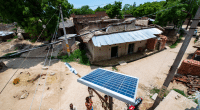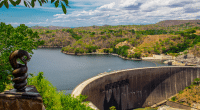The Kenyan government has given Kenya Electricity Generating Company (KenGen) the go-ahead to redevelop the Gogo hydroelectric dam in the west of the country. Its capacity will increase from the current 2 MW to 8.6 MW.
At a recent Cabinet meeting at State Lodge, Kisumu, in the west of the country, the Kenyan government approved the project to redevelop the Gogo hydroelectric dam. This is “an important milestone for the people of Western Kenya and demonstrates the government’s commitment to regional development”, says Peter Njenga, CEO of Kenya Electricity Generating Company (KenGen), the company developing the project.
It will enable the redevelopment of existing facilities on the banks of the Kuja River in Migori County. The hydroelectric plant, commissioned in 1958, has a capacity of 2 MW and “suffers today from frequent breakdowns and difficulties in the supply of spare parts due to the obsolescence of its infrastructure”, says KenGen. The company, majority-owned by the Kenyan state, aims to increase the plant’s capacity to 8.6 MW.
Read also- KENYA: a new geothermal power station in Menengai injects 35 MWe into the grid
“This project not only represents a step forward in the energy sector, but also brings economic growth, job creation and improved livelihoods for our communities, while contributing to our clean energy goals,” explains Peter Njenga. According to KenGen’s Managing Director, the project will contribute to Kenya’s ambition to reduce the use of fossil fuels in electricity generation.
Kenya already has one of the most diversified electricity mixes on the African continent, with an installed capacity of 2,819 MW, 828 MW of which is generated from geothermal power, ahead of hydroelectricity. Part of the grid’s electricity is also generated from photovoltaic solar power, wind power and biomass. But the East African country still imports fossil fuels, which generate 749 MW according to Power Africa.
Jean Marie Takouleu







